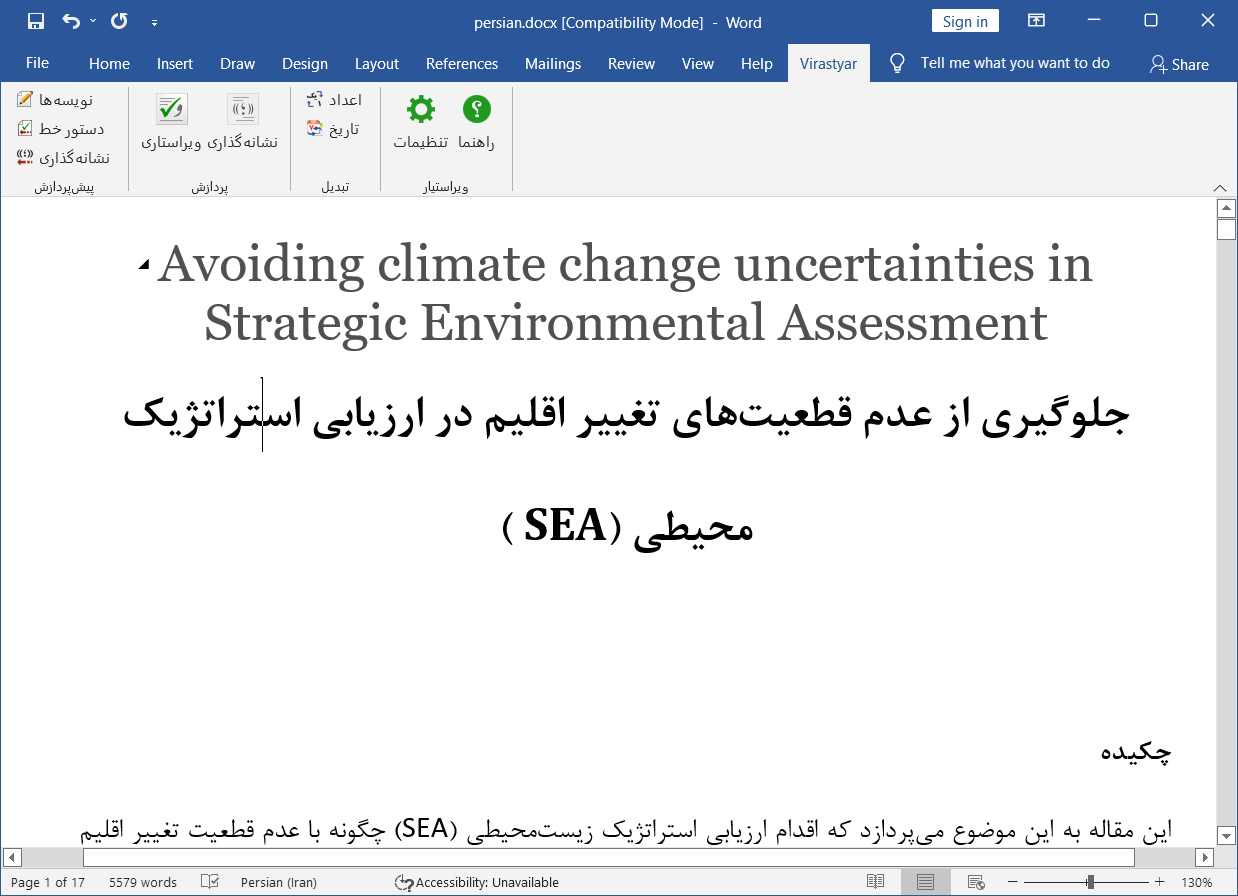چکیده:
این مقاله به این موضوع میپردازد که اقدام ارزیابی استراتژیک زیستمحیطی (SEA) چگونه با عدم قطعیت تغییر اقلیم در سیستم برنامهریزی دانمارک رفتار میکند. در ابتدا مدلی فرضی برای نحوه مواجهه و عدم مواجهه با عدم قطعیت در تصمیمگیری طراحی میشود. این مدل استراتژیهای «کاهش»، «انعطافپذیری»، «انکار»، «نادیده گرفتن» و «به تعویق انداختن» را در نظر میگیرد. سپس 151 SEA دانمارکی با تمرکز بر میزان پذیرش و ارائه عدم قطعیت تغییر اقلیم تحلیل میشود و درباره یافتههای تجربی مرتبط با این مدل بحث میشود. این یافتهها نشان میدهد که علیرغم انگیزههای انجام این کار، در تمام 151 گزارش موردبررسی بهجز 5 گزارش،از عدم قطعیت تغییر اقلیم اجتناب شده است یا نقش آن کماهمیت جلوه دادهشده است. درنهایت، دو مکانیسم توضیحی احتمالی برای توضیح این موضوع ارائه میشود: اجتناب از تعارض و نیاز به محاسبه عدم قطعیت.
Abstract
This article is concerned with how Strategic Environmental Assessment (SEA) practice handles climate change uncertainties within the Danish planning system. First, a hypothetical model is set up for how uncertainty is handled and not handled in decision-making. The model incorporates the strategies ‘reduction’ and ‘resilience’, ‘denying’, ‘ignoring’ and ‘postponing’. Second, 151 Danish SEAs are analysed with a focus on the extent to which climate change uncertainties are acknowledged and presented, and the empirical findings are discussed in relation to the model. The findings indicate that despite incentives to do so, climate change uncertainties were systematically avoided or downplayed in all but 5 of the 151 SEAs that were reviewed. Finally, two possible explanatory mechanisms are proposed to explain this: conflict avoidance and a need to quantify uncertainty.
چکیده
- مقدمه
- استراتژی های موجود در مواجهه با عدم قطعیت در تصمیم گیری
- متدولوژی
- نتایج
- مورد 1: شهرداری آلبورگ؛ طرح مدیریت فاضلاب در سال 2007
- مورد 2: شهرداری آلبورگ؛ طرح تأمین آب در سال 2009
- مورد 3: شهرداری هیورینگ: طرح آمایش شهری در سال 2009
- مورد 4: شهرداری استروئر؛ طرح آمایش شهری در سال 2009
- مورد 5: شهرداری وستیمرلند؛ طرح آمایش شهری در سال 2009
- دستاوردهای اجتناب از عدم قطعیت
- بحث و نتیجه گیری
- دلایل عدم مواجهه با عدم قطعیت تغییر اقلیم
abstract
- Introduction
- Strategies involved in uncertainty handling in decision-making
- Methodology
- Results
- Case 1. Aalborg Municipality: Waste handling plan 2007
- Case 2. Aalborg Municipality: Water supply plan 2009
- Case 3. Hjørring Municipality: Municipal spatial plan 2009
- Case 4. Struer Municipality: Municipal spatial plan 2009
- Case 5. Vesthimmerland Municipality: Municipal spatial plan 2009
- Implications of found avoidance practice
- Discussion and conclusion
- References
T. Wallington et al.
Theorising strategic environmental assessment: fresh perspectives and future challenges
Environ Impact Assess Rev
(2007)
T. Postma et al.
How to improve scenario analysis as a strategic management tool?
Technol Forecast Soc Change
(2005)
A. Perdicoúlis et al.
Causal networks in EIA
Environ Impact Assess Rev
(2006)
M.R. Partidário
Scales and associated data — what is enough for SEA needs?
Environ Impact Assess Rev
(2007)
M. Höjer et al.
Scenarios in selected tools for environmental systems analysis
J Clean Prod
(2008)
M. Godet et al.
Creating the future: the use and misuse of scenarios
Long Range Plann
(1996)
P.N. Duinker et al.
Scenario analysis in environmental impact assessment: improving explorations of the future
Environ Impact Assess Rev
(2007)
O. Bina
A critical review of the dominant lines of argumentation on the need for strategic environmental assessment
Environ Impact Assess Rev
(2007)
J. Alcamo et al.
Baseline scenarios of global environmental change
Global Environ Change
(1996)
J. Alcamo
Scenarios as tools for international environmental assessments
(2001)
S.R. Bartlett et al.
Scenario-based approaches in strategic environmental assessment
Bina, O. 2003, Re-conceptualising strategic environmental assessment: theoretical overview and case study from Chile,…
O. Bina et al.
Transition from Plan Environmental Impact Assessment to Strategic Environmental Assessment: Recommendations of the Project
L. Börjeson et al.
Towards a user’s guide to scenarios — a report on scenario types and scenario techniques
(2005)
S.R. Carpenter et al.
J. Chandler et al.
Techniques of scenario planning
(1982)
Chermack TJ. 2003, A theory of scenario planning. PhD Thesis, University of Minnesota; ProQuest Information and…
W.J. Cosgrove et al.
World water vision: making water everybody’s business
(2000)
EC-DGXVII
Energy in Europe: European energy to 2020 — a scenario approach
(1996)
The American heritage dictionary of the English language
(2000)
EEA (European Environmental Agency)
The European environment — state and outlook 2005
(2005)
EEA (European Environmental Agency)
European environment outlook
T.B. Fischer
The theory and practice of strategic environmental assessment: towards a more systematic approach
(2007)
M. Godet et al.
Introduction of scenario planning: an open future
Technol Forecast Soc Change
(2000)


نقد و بررسیها
هنوز بررسیای ثبت نشده است.